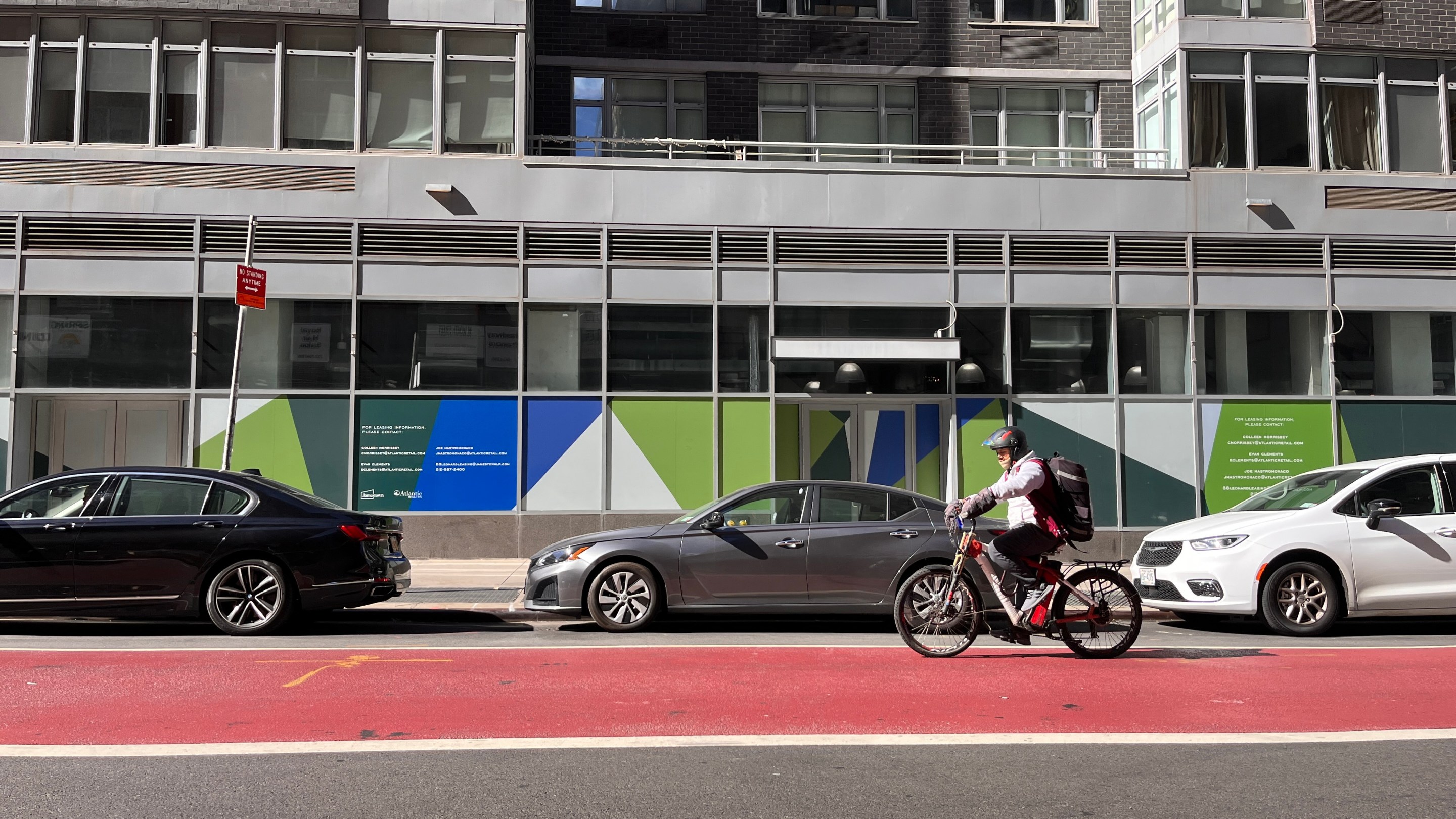App companies would have to provide safe mobility devices for delivery workers. Workers would have to be registered with the city. And a mostly immigrant workforce could be subject to harassment or worse.
These are the broad outlines of a new proposal by City Hall that was quietly (almost secretly) floated to regulate the delivery industry in New York City from what is ostensibly a free-for-all of 80,000 workers speeding all over town to make deliveries for low wages on dangerous roads and potentially lethal devices.
The proposal — which is not even a real bill yet and was not shared even with key players in the industry — is the first sign that the administration is considering regulations for app-based delivery companies, something the mayor promised when he announced in early 2024 that he would create a new "Department of Sustainable Delivery."
Well, there's no new department, just a set of rules that will be carried out by the already overworked Department of Transportation. So just what would the rules be? Let's break it down:
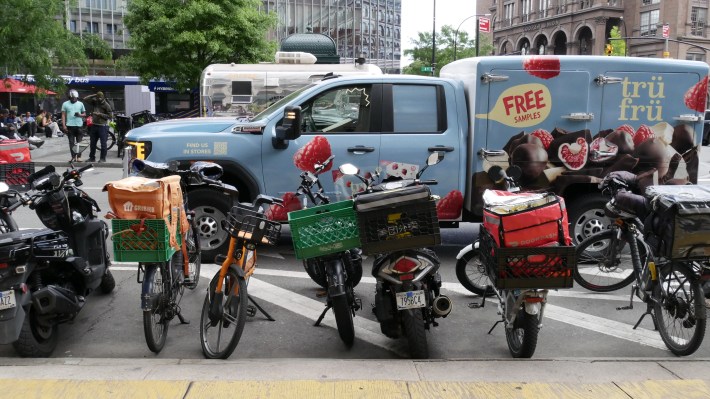
The apps
The proposal would force app companies to register with the Department of Transportation in order to do business on city streets. This would flip the industry on its head by forcing the companies to act more like employers who hire workers and less like technology companies that facilitate a process from which they are largely removed – though crucially the workers will still be independent contractors (more on that later). Here are the details:
- The bill redefines delivery from something that a firm does to something that a firm "facilitates, offers or arranges for," a key change, since apps have long hid behind their role as merely the creators of a piece of software that facilitates delivery, rather than a commercial delivery enterprise like DHL or UPS.
- The bill also redefines delivery work to include all goods, including groceries, whose delivery workers were left out of the minimum wage law, as Streetsblog reported last year.
- The bill requires any company facilitating commercial delivery (of any type of goods) in the five boroughs to register with the Department of Transportation in order to do business.
- The companies will have to maintain a roster of delivery workers and provide that to the city. (This is quite unlike how other delivery companies, such as DHL or UPS, operate; those companies do not provide such lists to the city.)
- Companies will have to provide trip data for each delivery, including: the ID number of the worker, when the order was placed, when the worker accepted the order, the time and locations of the pickup and delivery, the time period the worker was given by the app to make the delivery, GPS data of the worker's trip, the vehicle used by the worker and its proof of verification. (Companies currently provide anonymized data that aggregates trips, providing insufficient detail of each trip to the city.)
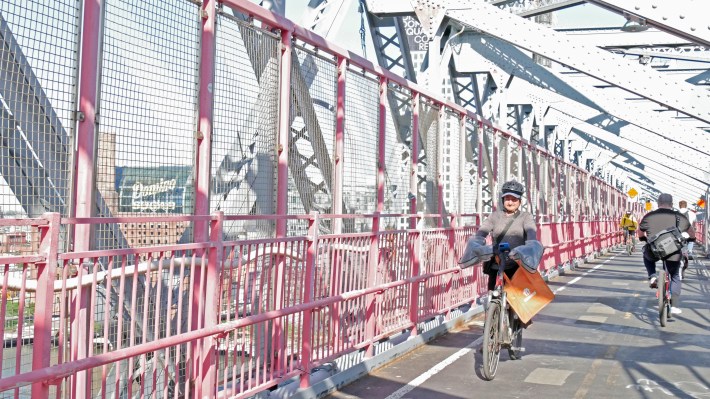
Industry stakeholders are optimistic that involving the delivery apps in regulation is needed, but warned against requiring too many expensive changes at once.
“The idea is the right one, but changes should be made carefully so they don’t push delivery prices up,” said Mike Peregudov, the CEO of Whizz, an e-bike rental service geared towards delivery workers. “It’s always said that apps are earning tons of cash, but if you look at their financial reports, that’s not exactly true. They don’t have big enough margins to implement new expensive standards without raising prices. But I believe it can be done properly."
A representative from Uber, one of the three major delivery companies operating in the city, told Streetsblog that the company had not yet seen the draft legislation. And a representative from DoorDash told Streetsblog that the company did not yet have a comment on the proposed bill. GrubHub did not respond to queries.
The workers
Advocates for delivery worker’s rights have long championed the idea that the burden of regulation should be placed on the wealthy companies, not the low-wage workers.
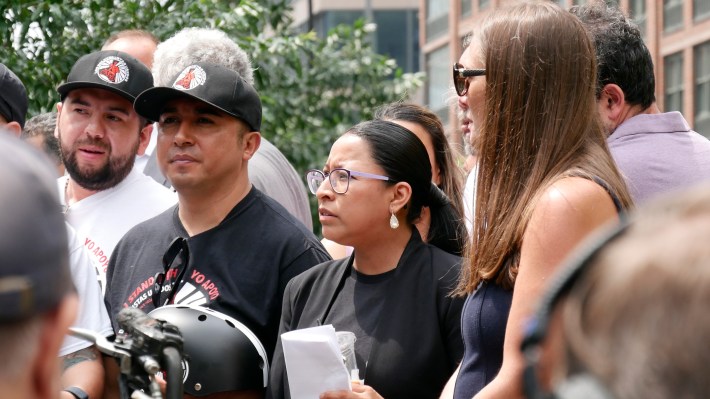
"We strongly support regulating the delivery app companies,” said Ligia Guallpa, the executive director of Worker's Justice Project, which won a minimum wage for workers in 2023. “We strongly feel that there needs to be clear accountability towards the big delivery companies who are responsible for the deaths of delivery workers on the job and the safety crisis on the streets of the city of New York.”
Guallpa had some concerns about whether the proposal ensures that all workers can keep making a living, given that workers have been suffering arbitrary deactivations since the minimum wage law went into effect.
“There are still no concise, real protections for workers that would empower them to fight back at the retaliation and the [speed] pressure that they're receiving from the app companies,” said Guallpa. “Any bill that is introduced with intent to hold companies accountable needs to come with deactivation protections and other additional protections that will protect workers.”
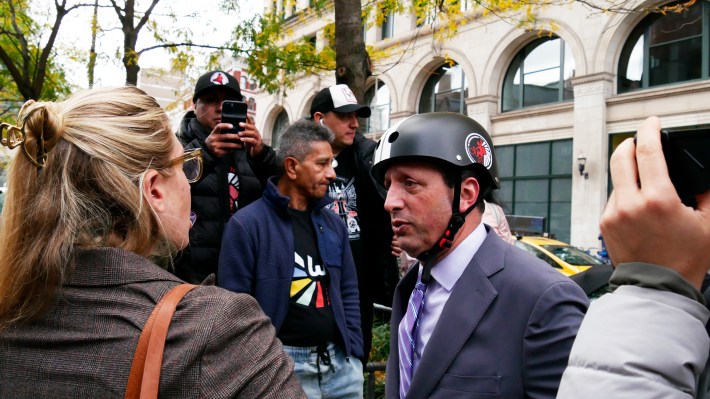
City Comptroller Brad Lander said he supports holding app companies accountable after the city allowed them "to operate unrestricted on New York City streets for nearly a decade," but he wants the proposal to go further.
"This proposal excludes measures to protect workers from arbitrary deactivation, leaving one of the root causes of reckless riding unaddressed and missing an opportunity to maximize safety,” said Lander, who released his own detailed report on app-company regulation last year.
The bill's provisions about workers leaves lots of unanswered questions:
- The bill would require workers to carry ID cards, helmets and wear protective vests showing their ID numbers (provided by the companies). If they don’t comply, workers would face a traffic violation of $20-$50.
- The workers will have to register biannually for $200.
- Each delivery company will maintain a roster of workers, including their names, addresses, start and end dates, identification number, contact information, and the type of bike and any necessary registration information (if the worker uses a moped, it needs to be registered with the DMV).
- Each worker will have to complete a safety course provided by the Department of Transportation.
- The businesses are responsible for the worker’s compliance with these new rules.
The workers, who are typically recently arrived immigrants, will still be considered private contractors and will lack basic labor protections. Given the current climate against immigrants — even those performing jobs that few Americans are taking — Guallpa is concerned about the registration component.
“There's a lot of fear in our community. In this political time, we need to make sure that we decrease the targeting of NYPD towards immigrant workers and make sure workers have the resources they need to navigate the system safely,” said Guallpa. “One of the biggest concerns that I have heard recently from deliveristas is about getting NYC IDs; they don’t want to disclose their information to the city. We're also deeply concerned to see an administration and a mayor who has been silent about whether New York City is going to continue to be a sanctuary city.”
The devices
The bill also addresses the bikes and mopeds that delivery workers use on the job, devices that have become part of a culture war that is encouraging politicians to seek to burden workers with fixing the "Wild West" feel of some roadways.
Last year, the Council held a hearing on Queens Conservative Democrat Bob Holden’s e-bike registration bill, which drew hundreds of people claiming they lived in fear over potential e-vehicle violence. The DOT opposes the bill, but the Adams administration remains sympathetic to the perception of fear.

“New Yorkers should not have to worry about e-bikes and mopeds speeding down our sidewalks or running red lights on our streets as they nearly mow down pedestrians,” the mayor told amNY.
But still advocates are hopeful that this bill signals the administration shifting the safety conversation from individuals and onto the companies.
“New Yorkers of all stripes are clamoring for a thoughtful, comprehensive framework to regulate the rise of this new category of economic activity that we've seen: the delivery app industry,” said Ben Furnas, the executive director of Transportation Alternatives. “I think the council has a real opportunity to seize this moment. My sense is that the council is very excited about taking this up. As a general framework, this is really the right direction, and we’re really looking forward to working with the council on this.”
Here’s how the draft legislation will affect the delivery vehicles and street safety:
- App companies will be responsible for ensuring that workers use certified vehicles with certified batteries, with DOT providing the framework for the companies to provide the vehicles free to workers.
- Delivery companies will have to keep track of crashes and incidents that occur on the job and inform the department in a not-yet-determined manner.
- The DOT will be able to improve safety by creating minimum allowable amounts of time that apps can give workers to complete trips, and by limiting incentives that the companies provide which encourage workers to go fast and break traffic laws.

Businesses in the industry surrounding e-bikes are cautiously optimistic, recognizing that this bill is a good start, but pointing out some lack of foresight about battery charging and battery disposal.
“It’s a very good step in the right direction to ensure that devices and batteries are safer,” said Ben Rosenn, the deployments and community affairs lead at Popwheels, which has worked with the city on battery swapping pilot programs. “If you're giving someone a device, however certified it may be, and then they're taking it home to charge in their wood frame house, that's not necessarily sufficient. And the delivery service should be required to provide safe charging infrastructure. Every battery that's being used for a commercial purpose is no longer a personal device. It's a commercial device and it should be covered by the recycling and charging standards that we are trying to put out for all of the batteries out there.”
Where is this all going?
The City Hall draft blindsided major stakeholders in the delivery industry and was merely leaked to amNY and not followed up with any press release, statements or even questions answered. (City Hall has not responded to several requests by Streetsblog for details.)
It's unclear if the bill is dead on arrival at the City Council because there's no bill yet and certainly not one that's even arrived.
“There is no such bill in the Council,” said Mara Davis, a spokesperson for Council Speaker Adrienne Adams. “An idea for a bill is not the same as a bill. If legislation on this is introduced by a member, it will go through the Council’s legislative process.”
